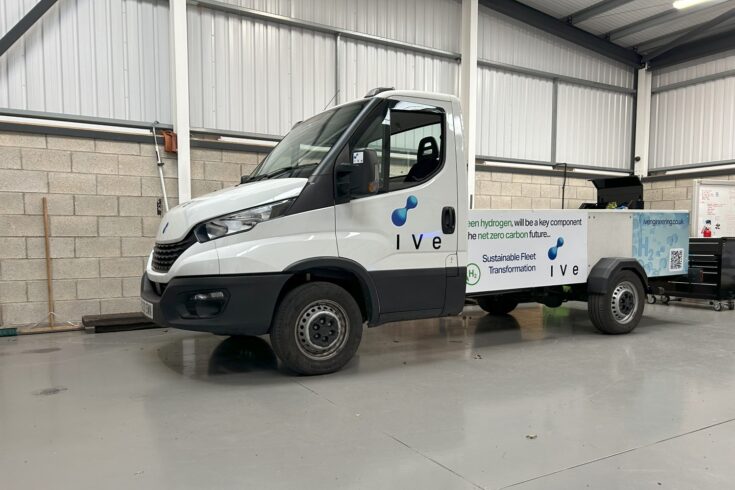Sustainable vehicle manufacturer Innervated Vehicle Engineering (IVe) aims to demonstrate the viability of a hydrogen fuel cell-powered van for a range of commercial uses as part of the Teesside International Airport Hydrogen Refuelling Hub consortium.
With supermarket and wider retail deliveries to customer homes continuing to expand, the impact of a high number and use of these diesel vehicles is significant in terms of emissions and net zero ambitions. While solutions are developing for electric vehicles, the potential environmental impact of building new vehicles with battery technology is still an issue.
A solution that combines the benefits of retrofit with alternative zero emission fuel options, such as hydrogen, would have the opportunity to change the game for the delivery sector.
Hydrogen electric zero emission large goods vehicle
IVe’s vehicle concept, which will benefit from being part of the wider Teesside consortium led by ELEMENT 2, will demonstrate the capabilities of hydrogen fuel cells as a power source for delivery vans in the region.
Using their already proven vehicle power concept, IVe will showcase not only the environmental benefits, but also the journey range, sustainability and payload advantages when compared to existing diesel and novel electric van options.
Feeding into the work and findings of the larger consortium, IVe’s project will capture and report valuable data on the efficiency and reliability of the vehicles, as well as feedback from users and the public.
The project scope
The project runs for a minimum of six months and will see the completion and testing of two hydrogen fuel cell-powered vans, each with a payload capacity of 1,500kg and a potential journey range of 600km.
Working with two market-leading operators across the retail sector as part of the demonstration, the vehicles will be retrofitted with IVE’s hydrogen fuel cell and powertrain technology to replace the existing diesel engine.
While embarking on the customer-focused routes, the project will test a number of data points around range, power efficiency, emissions and the impact of various weather and other driving conditions. It will also feed into the wider use case for the Teesside hydrogen refuelling hub and its potential environmental and economic impact for van-based activity centred around the region.
Aims and ambitions
The project aims to demonstrate the sustainability opportunity for hydrogen-powered transport in the region as well as the safety benefits as a new fuel source compared to diesel. This aims to de-risk the myths around the hydrogen concept in the eyes of potential customers and partners.
It will also focus on the environmental message, not simply in relation to replacing diesel and petrol fuels, which already has the potential to make a significant impact on UK road emissions, but also when it comes to the emissions from new vehicle manufacture and the advantage of retrofit technology.
Gathering valuable data on this, as well as for fine tuning design and capabilities to enhance the efficiency and performance of the vehicles, will also be a key output to support the commercial use case after this demonstration phase.
Discussing the opportunity of hydrogen power, Ram Gokal, CEO of IVe, said:
Electric power has a place, but it isn’t the answer from a sustainability point of view when you consider issues like battery life and charging requirements. Hydrogen fuel cells present less risk than diesel combustion engines from a safety point of view, while also being able to match up to mileage and capacity results as well.
This project isn’t aiming to change how vehicles are used and impact their users, but instead showcase how their fleet’s efficiency and environmental impact can be improved by their conversion to hydrogen power.
About the funding
This project is funded as part of the Hydrogen Transport Hub programme, opened in October 2022. The projects are funded by the Department for Transport and delivered in partnership with Innovate UK, with this programme providing £20 million across its projects.
The aim of this competition is to create a long-term sustainable demand for hydrogen from transport and to de-risk hydrogen’s adoption for transport owners and operators. This investment will support demonstrations of hydrogen powered vehicles across transport modes in real world operational settings across the Tees Valley.
This project is just one example of how Innovate UK and its partners are investing to realise the vision in the Transport Vision 2050 strategy document. This sets out what the UK transport system may look like in 2050, and outlines the likely steps along the way to achieving this.
Innovate UK and its partners are currently investing over £2 billion in transport programmes covering the pathways set out in the Transport Vision document.
Top image: Credit: IVe

